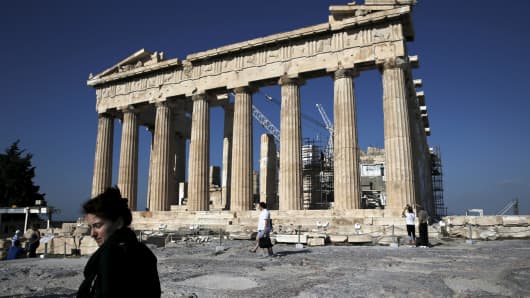With only days to go before Greece is unable to pay its external loan obligations, some argue that a Greek default within or outside the euro is the best outcome. But no matter how mediocre an agreement is for Greece, a deal of any sort is better than bankruptcy.
The newly elected Greek government missed its unique opportunity to sign an agreement earlier this year that might have been "better" than the one proposed to the conservative government originally. It lost this opportunity because first, the Greek government did not have ready a program that could be implemented, and second, it preferred to speak in a revanchist manner about Germany to the gallery of its left platform, rather than to its European partners.
Read More ECB faces crucial test of 'whatever it takes'
During the four-month ongoing negotiation, the Europeans toughened their position, noticing that Greece was often off-subject. When Greece and the Europeans could not reach a deal based on the technical analysis of the data, the Greek government spoke of the need for a "political negotiation." When the prime minister could not reach a deal with his counterparts, the negotiation was restarted from scratch at the technical level. And this cycle was repeated again and again. Four months passed this way.
This tactic of lengthening the negotiation was catastrophic for Greece for five reasons:
1) Greece lost the opportunity of a good agreement early on.
2) The huge, prolonged political and economic uncertainty created by the elections and the long negotiations had a devastating effect on economic activity, reduced tax revenue that Greece would have collected and increased unemployment.
3) Responding to the uncertainty, depositors emptied the banks.
4) The internal stay in payments in the last two months (during which Greece pays only salaries and pensions, and external loans and does not pay any other state expenses such as for procurement) has created conditions of utter lack of liquidity in the private sector.
5) Greece negotiates now with its back against the wall because of the lack of liquidity.
Having reached the last few days before Greece would not be able to pay its external loan obligations without a deal and money injection from the EU, we know that the deal will be much more severe on Greece than the one negotiated, but not finalized, in the fall of 2014.
Read MoreWhy deadlines are pointless when it comes to Greece
Bankruptcy and transition to a new drachma would be a major disaster for Greece, comparable to the "Asia Minor Disaster" when Greece lost a war to Turkey in 1922 and had to accept two million Greek refugees that used to live in Turkey. Greek banks would collapse from withdrawals of scared people, uncertain of the exchange rate between the new drachma and the euro. The heavily devalued drachma would immediately make Greeks much poorer as they would then only be able to buy half or one-third of what they used to under the euro. Shortages in necessities such as pharmaceuticals and fuel would be the rule and not the exception. And printing too many new drachmas would create hyperinflation, new devaluation, and poverty.
Some may say that Greece does not need to leave the euro in declaring bankruptcy. Why not just pay external loans and therefore default within the euro? A default within the euro would be extremely difficult to manage by any Greek government, especially by the present inexperienced government. Greece would need tremendous support from the ECB, which would not be forthcoming. Within a short period, the Greek government, voluntarily or under pressure, would go to the new drachma. Thus, both types of bankruptcy (within and outside of the euro) lead to the total disaster of the new drachma.
What would a good deal contain? Besides the fiscal issues, a good deal should emphasize the microeconomic reforms. It should reduce the huge and inefficient state sector that weighs down on the private sector and the taxpayers. Pensions should become proportional to contributions. The procurement mechanisms of the state should become competitive so that lower prices are achieved and corruption is reduced. Greece should proceed with the privatization of trains, airports, ports, and the energy sector. The "closed sectors" (such as pharmacies) should be opened to competition. The labor market should be liberalized. The business taxes and bureaucratic procedures should be reduced to attract new investment.
Finally, an agreement must restructure the Greek sovereign debt to European counties and the European Stability Mechanism. Without changing its nominal value, the best way to restructure the debt is to elongate its maturities. If maturities are moved to 75 years and the presently variable interest rates are converted to constant ones and slightly reduced, the net present value of the debt will be reduced by 50 percent. A 10-year grace period (during which interest is not paid but recapitalized) with the saved money invested would help growth. Growth is, in fact, the only guarantee that Greece will pay its debts.
Read MoreEl-Erian: Forget Greece, this has me worried
As we reach the last few decisive days, it is up to the Greek government to seal the deal with the Europeans. If it does not, it will be responsible for the chaos that will follow.
Commentary by Nicholas Economides, a professor of economics at the NYU Stern School of Business. He also has advised the Greek government and Bank of Greece.


